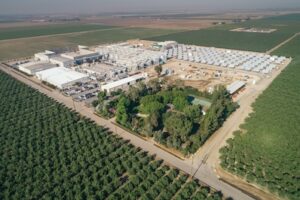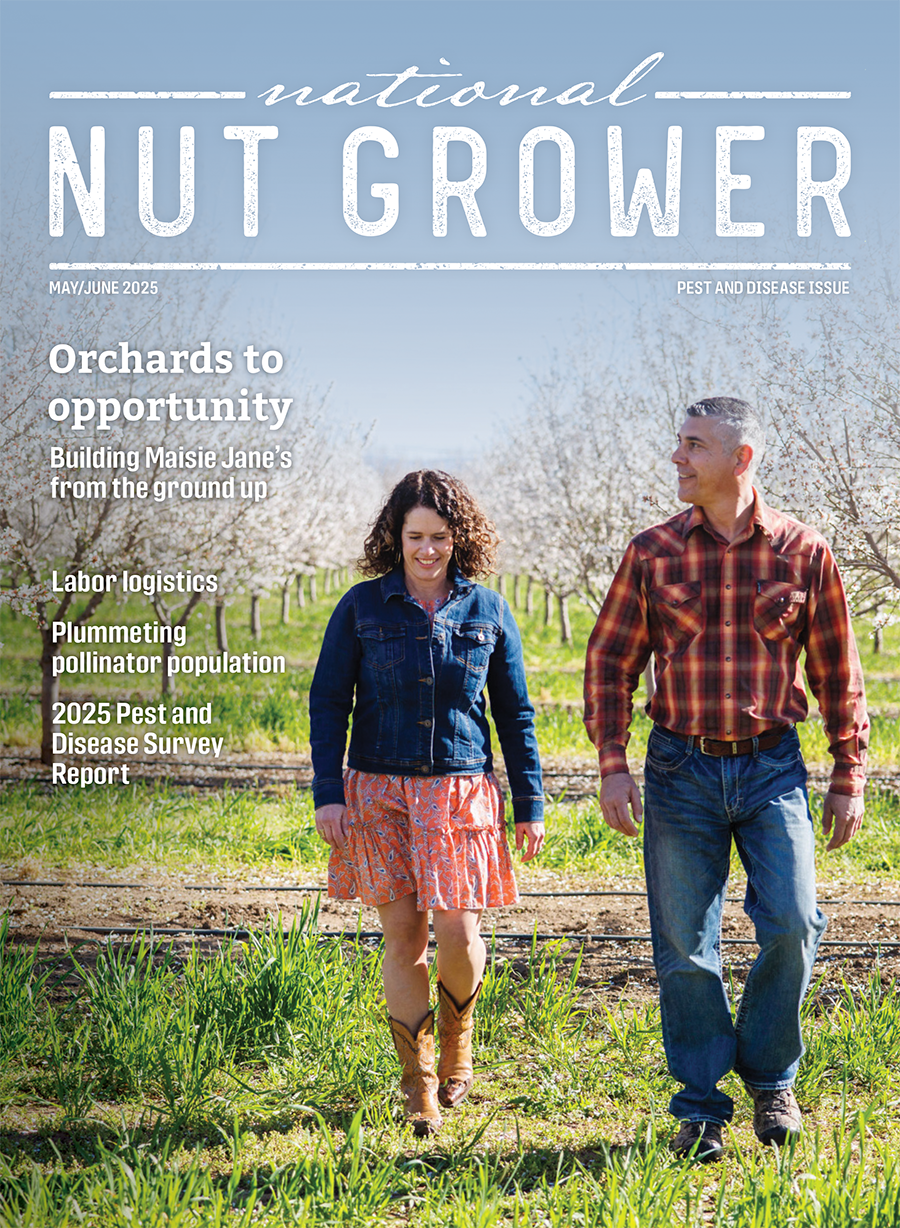
March/April 2025
Nichols Farms
Nichols Farms, a fourth-generation family operation based in Hanford, California, is committed to delivering premium pistachios and almonds from the heart of the fertile San Joaquin Valley.
It farms in three California counties, growing pistachios, almonds and organic pistachios on a total of 4,000 acres — 75% of which are pistachios — accounting for more than 80 million pounds.
Nichols Farms’ origins trace to 1954, when Graydon “Nic” Nichols and his wife Virginia cultivated row crops, primarily cotton, corn, wheat and alfalfa.
Wanting to diversify, the grandfather of James Nichols, a third-generation owner who serves as vice president of farming operations, planted almonds in 1981. Pistachios followed in 1983.
James’ father, Chuck, returned to the business around that time and started the pistachio processing operations.
At the time, entering nuts was viewed as something of a risk, as there wasn’t a true market developed or government subsidies to support the category.
“Fortunately, the public views of pistachios not being a healthy nut changed with research, and over the last 20 years, the industry has grown from a couple of hundred million pounds to last year recording 1.5 billion pounds,” James said.

James and Jeff Nichols are at the helm of their family’s fourth-generation pistachio and almond operation.
In Chuck’s first 15 years leading the pistachio business, it was mainly a bulk export business, putting product in super-sack containers and shipping it raw to other export countries.
“But, over the last 10 years, we’ve made a significant push to get into roasting and packaging consumer goods, as well as flavors,” said Jeff Nichols, another of Chuck’s sons, who oversees farming and processing activities. “My brother and I, plus other family members, are benefiting from the risk and vision that my grandfather and father saw.”
Over the last 10 years, Nichols Farms has tripled its volume and doubled its square footage, leading to a significant amount of expansion.
“We continue to invest in state-of-the-art equipment to ensure our quality remains first class,” Jeff said. “We implemented a brand refresh about five years ago, with the addition of six new organic flavors. We’ve also been getting a lot of new distribution as our brand continues to gain traction.”
Leveraging technology at Nichols Farm
Nichols Farms continues to leverage advanced technology, including precision agriculture and data analytics, to optimize crop growth and enhance the efficiency of its pistachio farming practices.
For instance, when James came back to the farm in 2013, he worked with his father on implementing an irrigation monitoring project to comply with California’s ongoing regulations.
“At the time, the technology wasn’t available, so we worked on developing our own technology. With the help of the family, we have commercialized that,” James said. “We now help other growers, both locally and up and down the state, execute irrigation plans.”
This certainly helps from a labor standpoint, and while it wasn’t designed to replace labor, it does help improve what an irrigator can do on a daily basis.
One of the newer technological advancements being harnessed on the farm is a pheromone used to prevent mating between pests on the farm, reducing Nichols Farms’ reliance on pesticides.
“Our pest control strategy really starts with prevention,” James said. “That’s removing the food source in the orchard for the main pest we battle, which is the navel orangeworm (NOW). We have a very robust winter sanitation program, which includes pruning, mummy shaking, scouting and manual labor as needed to knock nuts out of the tree and onto the ground where the fruit source will decompose on its own.”
Additionally, a few years ago Nichols Farms patented a machine, the Worminator, that picks nuts off the ground and grinds them up. It’s been an effective tool for managing the NOW population.
Water challenges
California’s Sustainable Groundwater Management Act passed in 2014. Regulations began hitting in 2024.
“Fortunately, we’ve had two very good water years, so we’ve relied on surface water as much as possible,” James said. “But, we just don’t know what the future will look like and what our reliance on groundwater will look like in those upcoming years.”
To mitigate water challenges, the operation uses on-farm recharge to receive groundwater pumping credits if surface water is diverted onto the farm. Additionally, Nichols Farms relies on automation tools to set a water budget.
Nichols Farm’s team approach
Between the plant and farm, Nichols Farms employs more than 400 team members, which increases to around 450 during the harvest.
“Our approach is to be a company that everyone wants to be a part of,” James said. “We treat our employees like family, and you can see it in our results – we have over 25% of employees who have been here at least 10 years. We listen to them and their concerns, and adjust things to make it a healthy work environment.”

California’s San Joaquin Valley. Photo courtesy of Nichols Farm.
After pistachios are harvested from trees, they are processed at the plant within 24 hours, though the production goal is less than 12 hours to maintain quality.
“You need to peel the skin and then dry it down to under 6% moisture, which is shelf-stable and won’t have any mold or bacteria growth on it,” Jeff said. “We will keep product in silos throughout the year and pull to do roasting and packaging. We also nitrogen flush all of our bags, which keeps the oxygen content under 5% to reduce and minimize rancidity. And we keep all of our finished goods in cold storage to make sure no pests get in it.”
Looking to the future
Nichols Farms plans to stay family-owned for the foreseeable future. Over the next five years, the company anticipates an average 8% yearly growth.
“Our success really starts in the field with the product we receive from the farmers,” James said. “We partner with a lot of on-the-ground family farms. We avoid any private equity farmers. We want to work with partners who are in it for the long haul. I believe that’s what makes our product superior.”









